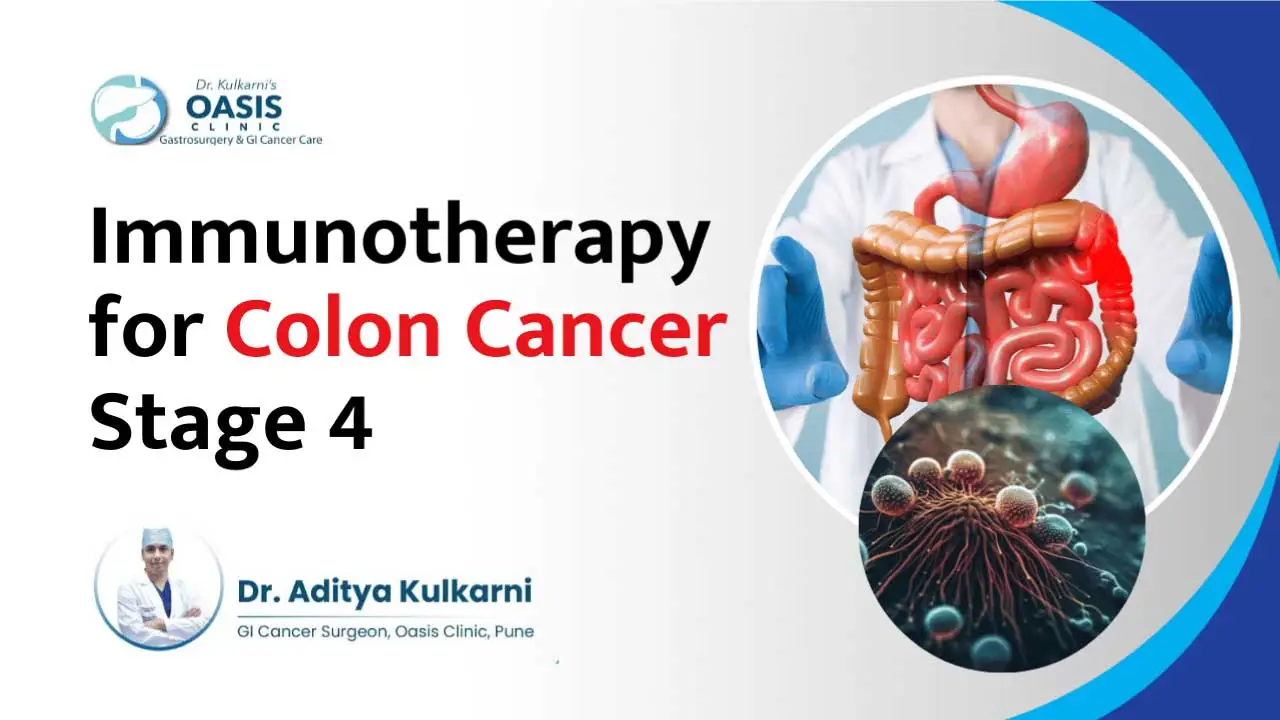Can Immunotherapy Cure Stage 4 Colon Cancer?
Cancer, a formidable adversary, continues to be a global health crisis, with India being no exception. The constant quest for more effective cancer treatments has led to significant advancements in medical science.
One such cutting-edge development is immunotherapy, a treatment approach that exploits the body’s immune system to combat cancer cells. This innovative strategy offers hope to countless patients worldwide, marking a new era in cancer treatment.

Unveiling Immunotherapy: An Overview
- Understanding Immunotherapy
- The Mechanisms at Play
- Success Stories and Breakthroughs
Also Read: Connection Between Obesity and Colon Cancer
Stage 4 Colon Cancer: The Challenge at Hand
- Defining Stage 4 Colon Cancer
Stage 4 colon cancer, also known as metastatic colon cancer, represents the most advanced stage of the disease. At this stage, the cancer has spread from the colon to distant organs and tissues, which presents a significant challenge for treatment.
- The Impact of Cancer Spread
The spread of cancer cells, or metastasis, complicates treatment and often makes surgery alone insufficient to eliminate the disease. It necessitates more aggressive and comprehensive treatment approaches, which can be challenging for patients to endure.
- Current Treatment Modalities
Conventional treatment options for stage 4 colon cancer include surgery, chemotherapy, and radiation therapy. However, these treatments come with their limitations, including potential side effects and varying degrees of success. Moreover, they do not always prevent the recurrence of cancer.
The Promise of Immunotherapy
- Immunotherapy in Colon Cancer Treatment
Immunotherapy is emerging as a potential game-changer in the battle against colon cancer, including stage 4 cases. By leveraging the body’s immune system, it offers a novel approach to tackling this formidable disease.
- Research Findings and Clinical Trials
Several clinical trials have shown promising results with immunotherapy in treating stage 4 colon cancer. While it’s not a standard treatment yet, the progress made so far is encouraging.
- Potential Advantages and Challenges
Immunotherapy could potentially offer fewer side effects and better targeting of cancer cells compared to traditional treatments. However, determining who will benefit most from this treatment remains a challenge. Furthermore, like all treatments, immunotherapy can still cause side effects, and not every patient responds to these therapies.
Can Immunotherapy Offer a Cure?
- The Big Question
While it’s too early to proclaim immunotherapy as a definitive cure for stage 4 colon cancer, several cases of significant improvement and even remission have been documented. These cases provide hope and motivation for further research.
- Patient Experiences
Many patients undergoing immunotherapy have reported improved quality of life and longer survival rates compared to traditional treatments. These personal experiences provide valuable insights into the potential benefits of immunotherapy.
- Expert Opinions
Medical experts, including seasoned oncologists like myself, see tremendous potential in immunotherapy. However, we agree that more research is needed to establish it as a standard treatment option and to understand how to optimize its use.
Factors Influencing Immunotherapy Success
- Patient Eligibility
Not all patients are suitable candidates for immunotherapy. Factors such as overall health, the type and stage of cancer, and specific genetic markers play a role in determining eligibility.
- Biomarkers and Predictive Factors
Research is underway to identify biomarkers that can predict how a patient will respond to immunotherapy. These predictive factors could revolutionize the way we select treatments for each patient, moving us closer to truly personalized cancer care.
- Patient Eligibility
Not all patients are suitable candidates for immunotherapy. Factors such as overall health, the type and stage of cancer, and specific genetic markers play a role in determining eligibility.
- Biomarkers and Predictive Factors
Research is underway to identify biomarkers that can predict how a patient will respond to immunotherapy. These predictive factors could revolutionize the way we select treatments for each patient, moving us closer to truly personalized cancer care.
- Ongoing Research
Continuous research and clinical trials are crucial for improving immunotherapy outcomes and expanding its application in treating stage 4 colon cancer. The future success of immunotherapy depends on these efforts.
Realizing the Vision: The Future of Immunotherapy for Colon Cancer
- Emerging Trends
The field of immunotherapy is rapidly evolving, with new developments emerging regularly. From creating more effective immunotherapies to combining them with other treatments for synergistic effects, the future is promising.
- Collaborative Approaches
The advancement of immunotherapy relies on collaborative research involving oncologists, immunologists, geneticists, and other specialists. This multidisciplinary approach fosters innovation and accelerates progress.
- Role of Awareness
Raising awareness about immunotherapy among patients and surgeon is crucial. Increased awareness can foster informed decision-making and encourage participation in clinical trials, both of which are essential for advancing this field.
Conclusion
The journey towards effectively treating stage 4 colon cancer with immunotherapy is ongoing. As a dedicated Gastrointestinal Surgeon, I am optimistic about the potential of this approach.
While we are still unraveling the full potential of immunotherapy, it’s crucial to remember that every step forward brings us closer to a future where cancer is no longer an insurmountable foe. Let’s continue to foster hope and resilience as we navigate this journey together.

Dr. Aditya Kulkarni
MS, DNB, FRCS, MCh (Surgical Gastroenterology & GI Oncology)
Dr. Aditya Kulkarni is a Consultant of Laparoscopic and Robotic Gastrointestinal, Hepato-biliary-pancreatic, and Cancer Surgeon at the Renowned Oasis Surgery Clinic Pune.
